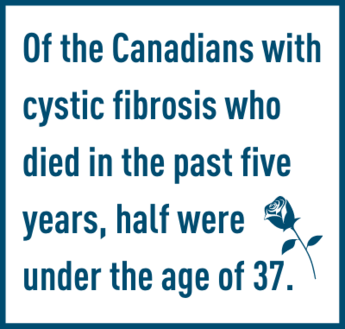Dr. Christine Bear, a biomedical researcher at SickKids Hospital in Toronto and a Professor at the University, focuses on understanding the genetic disease Cystic Fibrosis (CF) and developing strategies for targeted therapeutics. Currently, she leads a study to enhance the sensitivity of theratyping studies in nasal epithelial cultures derived from individuals with rare CF-causing mutations. This research, funded by Cystic Fibrosis Canada, aims to improve treatment adherence, minimize hospitalizations, and reduce the burden of managing CF. Dr. Bear's work represents a vital step forward in addressing the needs of the CF community.
Recruited by SickKids Hospital in 1988, Dr. Bear's tenure coincided with the landmark discovery of the Cystic Fibrosis Transmembrane Conductance Regulator (CFTR) gene, a pivotal moment that shaped her career. In simpler terms, the CFTR gene is like an instruction manual inside our cells that tells our body how to make a specific protein called CFTR. This protein normally helps salt move in and out of cells, which is crucial for keeping the lungs, digestive system, and other organs working properly.
Reflecting on this discovery, Dr. Bear emphasizes its profound impact: "The CFTR gene discovery provided the molecular foundation for understanding CF, enabling us to develop targeted therapies that continue to evolve today." This breakthrough explained why people have CF—when there are mistakes or mutations in this gene, causing the CFTR protein to not work right. This leads to thick, sticky mucus building up in the lungs and other organs, which can cause breathing problems and other health issues.
The discovery revealed CFTR's crucial role as a chloride channel essential for epithelial cell function. Epithelial cells are like the body's protective lining, found in vital organs such as the lungs, digestive tract, and pancreas. They help protect these organs and control what passes in and out. The CFTR protein acts as a tiny gate in these cells, allowing chloride (a type of salt) to move in and out, which is crucial for these cells to work properly. With a background in chloride channel research, Dr. Bear swiftly applied her expertise to unraveling how CFTR mutations disrupt cellular functions, leading to the characteristic lung and digestive issues in CF patients. "Understanding the mechanisms by which CFTR mutations impair chloride transport was pivotal," explains Dr. Bear. "It directed our focus towards developing therapies aimed at restoring function in affected tissues."
Initially focused on understanding the details of CFTR mutations, Dr. Bear's research expanded to investigate their clinical implications. Her early studies laid the groundwork for understanding how these mutations affect lung and gut function, defining key aspects of CF.
Subsequent studies involved academic and industry partnerships, partnerships that helped to shape our understanding our understanding of how certain faulty proteins, like the common F508del mutation and other rare CF mutations, can be fixed with medications.
Dr. Bear's research journey advanced significantly with the creation of CFIT (Cystic Fibrosis Individualized Therapy), a groundbreaking platform developed in partnership with SickKids and Cystic Fibrosis Canada. "CFIT was designed to predict the efficacy of personalized therapies using patient-derived nasal tissue cultures," she explains. This approach revolutionized CF treatment by providing more accurate predictions of therapy outcomes in individual CF patients.
Unlike conventional cell line models, CFIT's use of patient-derived tissues acknowledges the natural differences among CF patients, even those with the same CFTR mutation. "Each patient's experience of CF is unique," emphasizes Dr. Bear. "CFIT enables us to tailor treatments based on each individual's genetic profile, embodying the essence of personalized medicine."
Beyond her scientific contributions, Dr. Bear champions a collaborative research approach, forging partnerships across disciplines and institutions. "Collaboration is essential in tackling the complexities of CF," she stresses. "Working with experts from diverse fields allows us to develop better models and therapies, ultimately improving patient outcomes."
Looking ahead, Dr. Bear draws inspiration from recent breakthroughs in CFTR modulator therapies, such as Trikafta. "The transformative impact of Trikafta on patients with Delta F508 mutations underscores the profound potential of research translating directly into significant benefits for CF patients," reflects Dr. Bear. "It highlights the urgent need to broaden access to effective therapies across all CFTR mutations, ensuring that every individual can benefit from advancements in CF treatment."
Patient engagement remains at the heart of Dr. Bear's research philosophy. "Patients are not only participants but also integral partners in our research efforts," she emphasizes. "Their unique perspectives and experiences guide our work, driving our commitment to develop more effective treatments and, ultimately, find a cure for CF. Their input is invaluable in shaping the direction of our research and ensuring that our efforts directly address the challenges faced by those living with CF."
Dr. Christine Bear's pioneering research exemplifies the synergy of scientific inquiry, patient advocacy, and collaborative innovation in the fight against cystic fibrosis. Through her leadership at SickKids Hospital and her pivotal role in advancing personalized CF therapies through initiatives like CFIT, Dr. Bear continues to redefine the landscape of CF research. Her dedication offers not only hope but also personalized care to individuals and families affected by this challenging genetic disorder.
In her final message to the community, Dr. Bear expresses profound gratitude for the invaluable contributions of CF patients and their families who have generously provided their cells and engaged with the CFIT program. "Their trust and collaboration have been essential in advancing our understanding and treatment of cystic fibrosis," Dr. Bear reflects. "Advocating for improved access to therapies like Trikafta is a core mission for us, and with more data and outcome assessments, we aim to expand its application to benefit those with rare mutations." She underscores her commitment to leveraging the CFIT platform to enhance treatment accessibility and effectiveness, reaffirming her dedication to improving the lives of individuals affected by CF through innovative research and personalized care.


.png)

.png)
